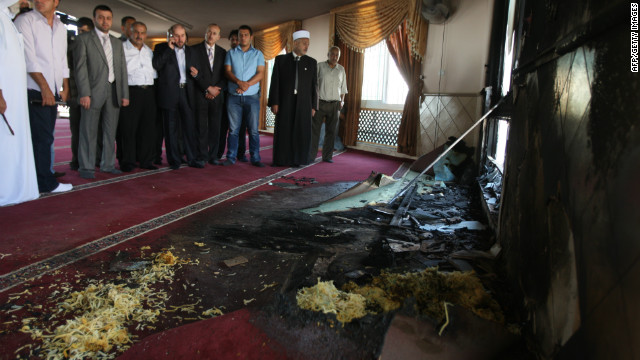Message of settler violence to Israeli state: don't give another inch or else….
A Palestinian mosque in the village of Jabaa, vandalized and partially set on fire by settlers last Tuesday morning. Report & photo CNN.
Israel’s ‘price tag’ terrorism has tactical political goals
Jonathan Cook, The National
June 22, 2012
Violent, so-called “price tag” attacks by Jewish settlers have become a staple of life for Palestinian communities over the past few months. The latest is the torching this week of a mosque in the village of Jaba, close to the city of Ramallah.
Palestinians in areas of the West Bank under Israeli control live with settler neighbours who beat and shoot them, set alight fields, poison wells, kill livestock and steal crops. These acts of terror have begun to spread elsewhere: homes, cars, cemeteries, mosques and churches are now targets in East Jerusalem and Israel too. Earlier this month a school and several cars were vandalised in Neve Shalom, the only genuinely mixed Jewish-Arab community in Israel.
Invariably the “price” invoked by the settlers is unrelated to any Palestinian action. Instead Palestinians are punished indiscriminately for the smallest concession the settlers fear Israel might make in the diplomatic arena.
Superficially, the settlers’ behaviour looks like a particularly vicious form of tantrum-throwing, but there are tangible benefits to be gained from the trail of destruction they leave behind.
They provided a clue to their reasoning, as they always do in “price-tag” attacks, on the walls of Jaba’s mosque. In black spray-paint, they spelt out their grievance: “Ulpana”.
Ulpana, also near Ramallah and home to 30 Jewish families, is a settler “outpost” – one of more than 100 such settlements-in-the-making that are scattered across the West Bank. Unlike a similar number of much larger and more established settlements, which are illegal under international law, the outposts violate Israeli law too.
After years of petitions from human-rights groups, Israel’s Supreme Court has reluctantly ruled recently that Ulpana must be removed. D-Day for the settlers, July 1, is rapidly approaching.
The torching of the mosque – the settlers’ trump card – was intended chiefly as a reminder to Israel’s right-wing government, led by Benjamin Netanyahu, that any move against them risks triggering a round of intensified violence that will further damage Israel’s image with the international community.
But it was also designed to dampen the enthusiasm of the courts for further costly run-ins with settlers. The Supreme Court, settlers hope, will be in no hurry to enforce the destruction of future Ulpanas.
Following the torching of Jaba’s mosque, Mr Netanyahu made the usual formulaic nods towards enforcing the rule of law. Dan Halutz, a former military chief of staff, was more candid, admitting there was no will to stop such attacks. “If we wanted, we could catch them [the perpetrators], and when we want to, we will,” he told Army Radio.
There are no signs a change of heart from the army is imminent. In fact, quite the reverse: for the past two decades the settlers have been strenuously working to take over the military’s combat units and its top ranks. What was once the Israeli people’s army is now very much the preserve of the settlers. The resulting collusion has been amply on display in recent weeks as a stream of embarrassing “occupation videos” has surfaced.
A few weeks ago, for example, Shalom Eisner, one of the new breed of settlers turned army commander, was caught on film smashing his rifle butt into the face of a Danish peace activist in the Jordan Valley. Mr Eisner’s only remorse, after the video was aired on Israeli TV, was to concede: “Maybe it was a professional mistake to use the gun when there were cameras around.”
And last month Palestinians in Asira Al Qibliya, near Nablus, filmed soldiers abetting armed settlers as they attacked the village. While villagers threw stones to repel the invaders, settlers opened fire, seriously injuring a youth. All the while, the soldiers could be seen guarding the settlers, clearly neither in danger from the Palestinians nor interested in stopping the shooting.

